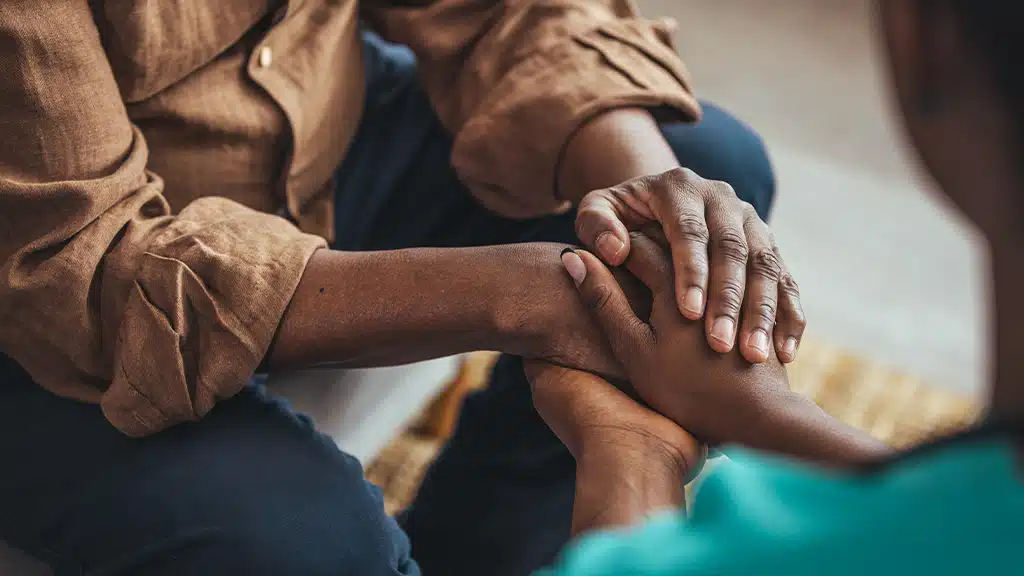Saprea > Online Healing Resources >Common Symptoms: Dysfunctional Relationships
We all come across relationships in our lives that are difficult to navigate. These relationships might be familial, romantic, professional, social, or simply casual acquaintances. Challenges in our relationships may stem from differences in background, experience, opinion, interests, goals, or personality. Such differences may require more patience, support, and compromise for a relationship to work. And these differences are signals that a specific relationship may be best managed at a distance, with the help of a mental health professional, or perhaps discontinued altogether.
We absolutely need social support and connection in our lives—particularly when we are working to heal from a traumatic past.1 But certain relationships may create more distress than fulfillment. They may have a harmful impact on our well-being, as well as the well-being of the other person involved. In some instances, we may be unhappy with both ourselves and the other person but not know how to make a change in the dynamic. Other times, we may feel conflicted about ending a relationship or reducing the level of investment and/or interaction.
And there may even be times when we aren’t fully aware that we are in a relationship that is dysfunctional. Whatever the situation, identifying why a relationship may not be working is a crucial step in building a circle of support. A circle of support consists of the people in your life who you can trust and lean on as you work through your trauma.
What Makes a Relationship Dysfunctional?
A variety of factors can influence the quality or stability of a relationship. And even more variables come into play when we consider that no two relationships are the same. Yet there are some foundational traits by which the quality of a relationship can be measured.
In general, a relationship can be characterized as dysfunctional when it features:2,3
- Low levels of trust.
- Low levels of safety.
- Low levels of authenticity.
- Low levels of support.
- Low levels of communication.
These characteristics can lead to a wide range of dysfunction that could manifest as disagreements, dissatisfaction, or even with one or both parties being at risk of abuse. Some of the common outcomes might include:
- Being unable to resolve conflict in a healthy manner.
- Being unable to communicate, set, and maintain boundaries.
- Being unable to empathize with or feel empathy from the other person.
- Struggling to enjoy sexual intimacy in romantic relationships.
- Struggling to remain invested, committed, and/or faithful to the relationship.
- Struggling to feel a sense of high self-worth or security.4
While dysfunctional relationships are common across all ages and demographics, survivors of trauma are especially vulnerable to experiencing these types of relationships.5,6
Are Dysfunctional Relationships Natural for Survivors of Child Sexual Abuse?
How we relate to and interact with others in adulthood is heavily shaped by our experiences as children. As our brains develop throughout childhood and adolescence, we observe the behaviors and actions of others.7 These observations help us to establish our own understanding and expectations of relationships and social situations.
This is why a survivor’s perception of themselves, others, and relationships can be significantly altered by the trauma of child sexual abuse. This trauma not only pertains to the abuse itself but to how it can influence the survivor’s sense of safety, self-worth, and understanding of what a relationship looks like. This influence may include the following:5
- Feelings of betrayal.
- Feelings of stigmatization.
- Feelings of powerlessness.
Feelings of Betrayal
Oftentimes, feelings of betrayal accompany child sexual abuse. The survivor may experience these feelings both towards the person who abused them—especially if that person was a trusted loved one—as well as towards those who failed to protect the survivor or support them after disclosure. Such deep feelings of betrayal and hurt can make it difficult for a survivor to trust someone again. This distrust can lead to an aversion to relationships, even when a survivor is experiencing feelings of isolation and loneliness. Distrust can also lead to relationships where suspicion and anger are prominent elements.3
For other survivors, feelings of betrayal stemming from childhood trauma can later manifest as a need to regain trust and security. Such a need may lead to survivors displaying a trustworthiness in people who do not earn it. As a result, adult survivors of sexual abuse can be especially vulnerable to relationships that involve physical, psychological, and/or sexual abuse.5
Examples
Feelings of Stigmatization
While progress has been made in our society, misconceptions, misinformation, and outdated views on child sexual abuse persist. A general lack of awareness and education on the issue increases the likelihood that a sexually abused child or teen will develop feelings of stigmatization. This stigmatization often leads to feelings of shame, low self-esteem, and low self-worth. Such effects may foster a survivor’s belief that they are unworthy of love or of a partner who respects and values them. Like low levels of trust, low self-worth may hinder a survivor from engaging in or committing to relationships, even when they are in need of social connection and support. Low self-worth can also reduce the chances of a survivor withdrawing from a relationship that is detrimental to their health and well-being.
Examples
Feelings of Powerlessness
Child sexual abuse can result in what is called “learned helplessness,” or feeling like you have no control in a situation and therefore no reason to try avoiding, changing, or escaping the hurt it is causing you.8 This sense of powerlessness can play into adult relationships, particularly relationships where there is a low level of emotional and physical safety. A survivor may therefore choose to stay in relationships that are harmful or avoid setting boundaries or initiating changes that may improve the relationship.
Ultimately, being in a relationship involves two people, and how the other person responds to proposed changes or established boundaries is not within the survivor’s control.
Oftentimes a relationship may require the help of a counselor or therapist, which we strongly encourage to pursue. Other times, it may be in the survivor’s best interests to leave the relationship behind. This is especially the case if the survivor is in a relationship involving physical abuse. Situations involving domestic violence, along with other types of abuse (sexual, verbal, emotional), are never okay and endanger the health and safety of the survivor.
That being said, feelings of powerlessness may make it more difficult for a survivor to initiate change, seek the support of a professional, or to remove themselves from a distressing situation or relationship.
Examples
Can a Dysfunctional Relationship Be Fixed?
Every relationship is different, and the outcome best suited to your well-being within that relationship depends on many factors. In some instances, relationships can be strengthened with additional resources and strategies, such as assertive communication or a professional mediator. In other instances, a dysfunctional relationship may require being put on hold or put to rest for the sake of everyone involved.
But whether you are a survivor or not, relationships are important. And when it comes to healing from trauma, creating a strong support system can be a powerful foundation to build on.1 It’s essential to include people in your support system who can hold space for you when you turn to them for guidance, validation, and empathy.
Resources to Help Address Dysfunctional Relationships

Navigating Your Relationships

Assertive Communication

